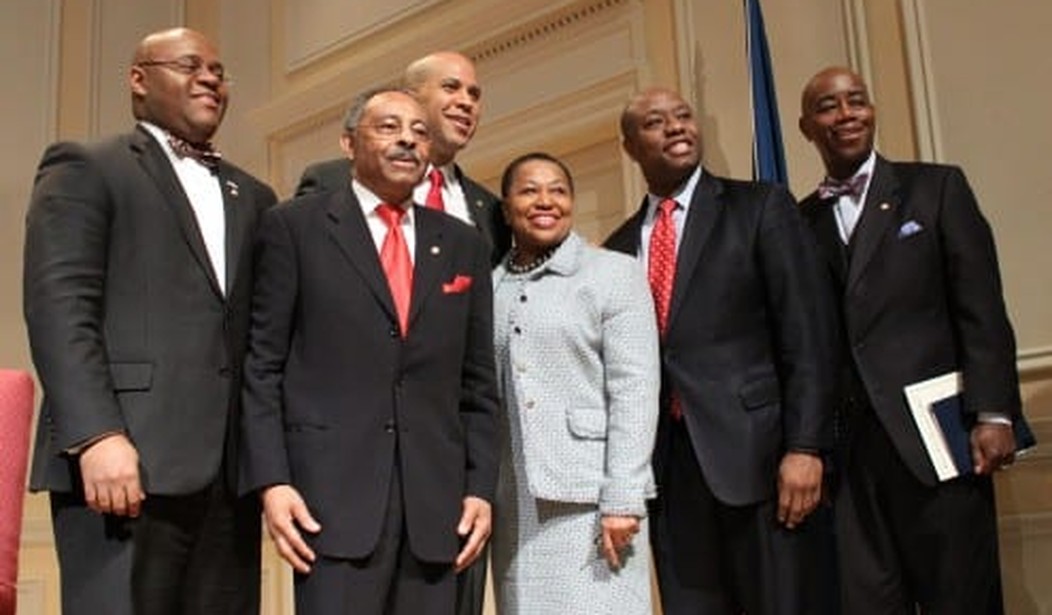WASHINGTON – A panel of black senators emphasized the importance of inspiring the next generation of leaders and called for an end to bipartisan gridlock at a Tuesday event marking the end of Black History Month.
Five of the only nine African-Americans who have served in the entire history of the U.S. Senate attended the event called “Honoring Our Past, Celebrating Our Future: Discussing Personal Journeys and a Nation’s Progress with America’s Black Senators.”
Former Democratic Sens. William “Mo” Cowan (Mass.), Roland Burris (Ill.), and Carol Moseley Braun (Ill.) joined Sens. Corey Booker (D-N.J.) and Tim Scott (R-S.C.), who organized the event, at the Library of Congress.
President Obama, who represented Illinois in the Senate from 2005 to 2008, was invited but did not attend. Scott’s office said 94-year-old Massachusetts Republican Ed Brooke was unable to attend for personal reasons.
“One of the reasons why I wanted to bring us together was so we can share with the world … that all things are absolutely, positively, unequivocally possible in the United States of America,” said Scott, who spoke with Howard University students later in the day about his opportunity agenda.
The panel of lawmakers discussed the importance of young Americans challenging themselves to achieve success.
“I think I’m the only United States senator to ever fail civics,” Scott said. But he said his mother’s persistence and hard work and the help of a local fast food restaurant operator, who served as his mentor, were key to change the course of his life.
Scott said he learned from his mentor that you can have a positive impact on the lives of the people in your community.
“A good guy who saw something in me that I could not find if I had a map,” Scott said. “He saw potential, and for four years, the last four years of his life, he died at 38 years old, he spent the last four years of his life helping to re-create the first four years of my new one.”
Booker said he was aware of the battles that previous generations of African-Americans have fought and the privileges that they have afforded to later generations.
He shared a story about being invited to be part of a “finding-your-roots” show in which he was paired with civil rights leader Rep. John Lewis (D-Ga.). “Immediately I knew that was problematic. Because the show starts with our bios, and it starts with, ‘John Lewis, hero of the civil rights movement stood on the Edmund Pettus Bridge staring down Alabama state troopers. … He literally bled the southern soil red,’” Booker said, in a deep announcer voice. “And then it goes to me. ‘Cory Booker, riding his Big Wheel in affluent suburbia, falls off and skins his knee: He bled the New Jersey soil red.’ And so you are very aware if you were born after the civil rights movement, if you were in my generation, that you stand on the shoulders of giants.”
Booker told the audience he was sitting before them today because of “the sacrifices and struggles of countless people” and “a grand conspiracy of love.”
“We prove worthy of the privileges that we have not by paying anything back, but by paying it forward,” Booker said.
The 113th Congress is the first to include two African-American senators from both parties serving simultaneously.
The event steered away from partisanship and the panelists mostly spoke about their path to the Senate.
The former senators, however, urged Congress to put aside partisan politics and work to find common ground.
“These issues that we face are critical to the world and to have the kind of gridlock and stand-off and partisanship that I’ve seen as an observer from the outside just does a great disservice to our country,” Moseley Braun said. “And I don’t know who needs to start the conversation or whether we need to just wrap it up. But the fact of the matter is that this kind of partisanship that we’ve seen does a disservice to the legacy of the Senate, to the importance of the institution and to our whole country.”
Cowan, who left the Senate last year after serving for six months to temporarily fill John Kerry’s seat, noted that while the Senate has its flaws and partisan disputes, the body’s problems can still be fixed by its members.
“When I left the floor of the Senate, I said that there was nothing wrong with the Senate that can’t be fixed by what’s right with the Senate … the people in the body are fully empowered to make the Senate and the Congress at large work as effectively as the American people need it to be, as long and only if they’re willing to do so,” Cowan said.
A young man from South Carolina, who is mentored by Scott, read the biographies of Obama and Brooke, as well as those of Sens. Hiram Rhodes Revels (R-Miss.) and Blanche Kelso Bruce (R-Miss.), who served during the Reconstruction era.









Join the conversation as a VIP Member